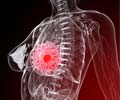Highlights:
- Breast cancer is one of the most commonly diagnosed cancers as well as one of the leading causes of mortality worldwide
- It is caused by a complex interplay between several genetic and environmental factors
- Several new commonly occurring gene variants contributing to increased breast cancer risk have been identified in current study.
Importance of Genetics in Breast Cancer Development
Most of the breast cancers (nearly 90 percent) are associated with acquired mutations (alterations) in specific genes or combinations of genes during a woman’s lifetime. Also, certain genes such as BRCA1 and BRCA2 genes are inherited genes that account for less than 10 percent of all breast cancers. It is thus evident that genetics plays an important part in breast cancer development along with interactions with environmental factors such as diet and lifestyle and exposure to chemicals and toxins.Notably, the inherited gene variants are associated with a high risk of getting breast cancer; however the commonly occurring gene variants are associated with only a minute risk but presence of many such variants simultaneously increases the risk several fold.
Identification Of New Commonly Occurring Gene Variants Associated With Breast Cancer
The huge project undertaken by the OncoArray Consortium, comprised of 550 scientists from around 300 different institutions spread over six continents. Overall, genetic data from 275,000 women, was analyzed, of whom 146,000 had been diagnosed with breast cancer.
The notable findings of the study included the following:
- Seventy two gene variants were identified, of which 65 were commonly occurring variants and seven were associated with the development of estrogen receptor negative breast cancer. Following the study the total number of commonly occurring gene variants is now around 180.
- Using epidemiological data and other data from breast tissue, the team was able to predict the target genes involved in most breast cancer cases.
- The study found genetic regions specifically associated with either estrogen-receptor positive or estrogen receptor negative breast cancer, confirming the fact that these are biologically distinct entities with different mechanisms of development.
- Interestingly, most of these commonly occurring gene variants were present not within the genes but in regions of the genome that was involved in regulating the activity of nearby genes.
Adds Professor Peter Kraft at Harvard TH Chan School of Public Health, USA, says: "Given the size of these studies, we expected that we would find a lot of new breast cancer risk variants, but the studies tell us a lot more about which genes are involved, revealing many previously unsuspected genes and genetic mechanisms underlying breast carcinogenesis.
This should provide guidance for a lot of future research.”
Scope of the Study
The findings of the study have a lot of far reaching implications and applications including- Identifying and predicting the risk of breast cancer development in all women in general as well as BRCA mutation carriers.
- Understanding the mechanisms of development of estrogen receptor (ER) positive and ER negative tumors will help develop newer and effective treatments.
- Findings of the study may change the screening practices and imaging techniques used to detect breast cancer. For example, women at risk (positive family history) may be recommended to undergo mammography from an earlier age. Similarly MRI may be used in high risk women as it is more sensitive than ultrasound imaging.
In conclusion the findings of this study could well be a turning point in breast cancer research and guide many future research activities as well.
References:
- Overview - Breast Cancer - (https://www.bcaction.org/our-take-on-breast-cancer/environment/)
- Breast Cancer Fact Sheet - (http://www.breastcancer.org/about_us/press_room/press_kit/facts_figures)
- BRCA1 and BRCA2: Cancer Risk and Genetic Testing - (https://www.cancer.gov/about-cancer/causes-prevention/genetics/brca-fact-sheet)
Source-Medindia
















